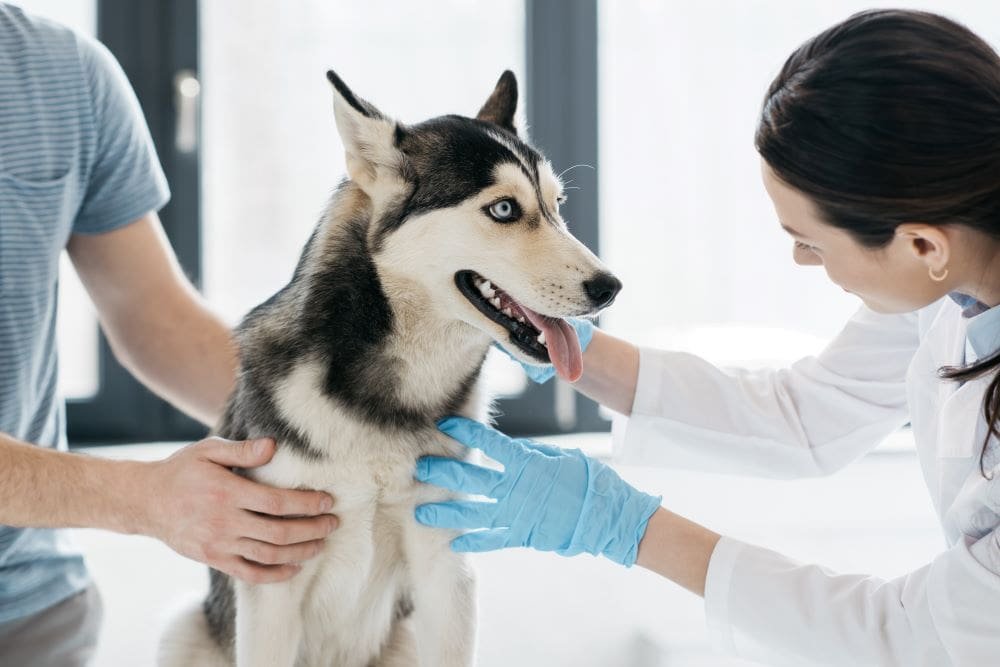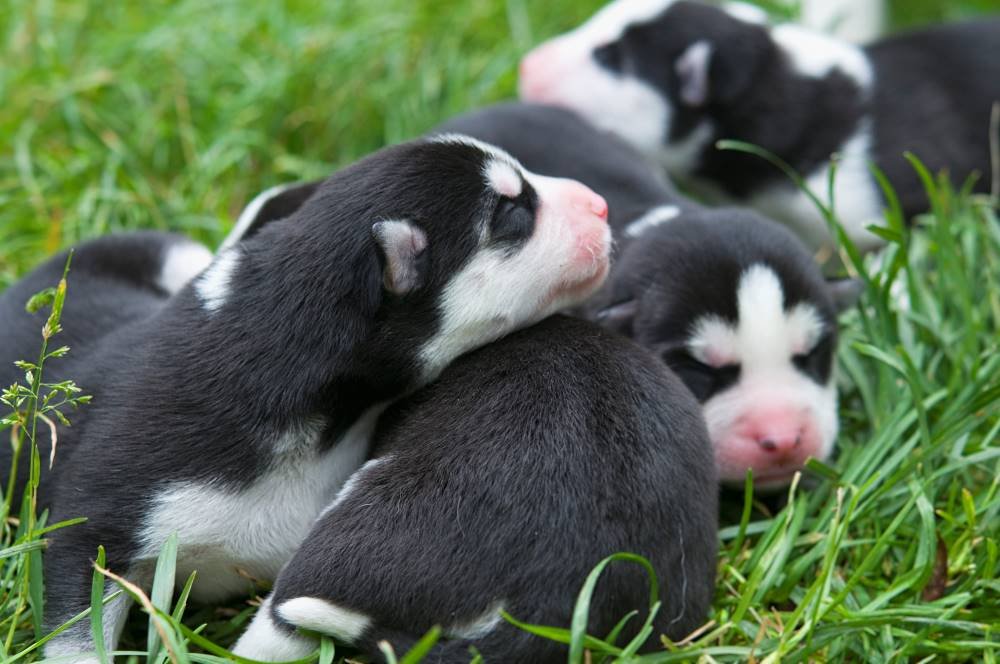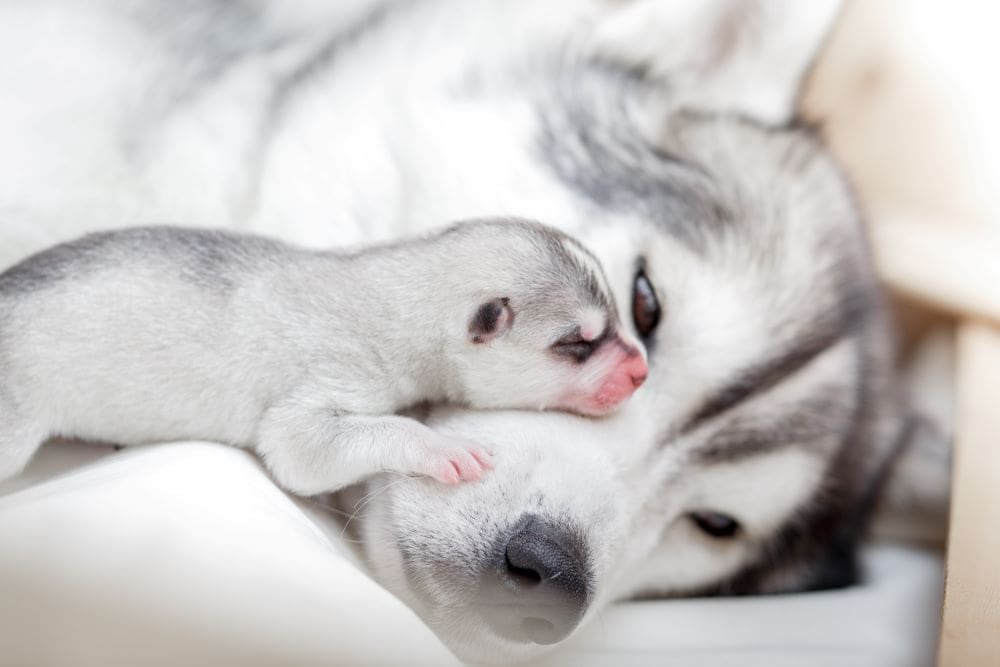Table of Contents
Canine pregnancy is a fascinating journey that every dog owner should familiarize themselves with, especially if they have a pregnant Husky. Understanding the timeline and the various stages of pregnancy is crucial for the overall well-being of the mother and the health of the puppies. So, how long are Huskies pregnant? Let’s dive into the intricate world of Husky reproduction and unravel the magic of nature.
Timeline: How Long Are Huskies Pregnant
The gestation period of a Husky can vary slightly from dog to dog, but on average, it lasts around 63 days. This timeline begins from the moment of conception, which typically occurs during the female dog’s heat cycle.
It’s important to note that the exact date of conception can be challenging to determine, as dogs can mate multiple times during their fertile period. However, once you have a rough estimate of the breeding date, you can count forward approximately 63 days to anticipate the arrival of the litter.
Signs of Pregnancy in Huskies
Detecting pregnancy in Huskies can be a bit tricky, especially during the early stages. However, observant owners may notice subtle changes in their dog’s behavior and physical appearance. One of the earliest signs is a decrease in appetite, which may be accompanied by bouts of morning sickness.
Additionally, you may notice changes in your Husky’s nipples, which could become enlarged and more prominent. As the pregnancy progresses, your Husky may gain weight and her belly will start to expand. It’s always best to consult with a veterinarian to confirm the pregnancy and monitor the health of both the mother and the developing puppies.
Husky Pregnancy Stages and Symptoms
The Husky pregnancy journey can be divided into three distinct stages – early, middle, and late pregnancy. Each stage brings its own set of changes and symptoms.
During the early stage, which lasts for approximately the first 3 weeks, the fertilized eggs travel to the uterus and begin to implant. At this point, your Husky may experience morning sickness, loss of appetite, and fatigue. While these symptoms may seem worrisome, they are completely normal and typically subside after a few weeks.
The middle stage, spanning from week 4 to week 6, is a critical period of fetal development. The puppies’ organs form, and their gender becomes apparent. Your Husky’s belly will become noticeably larger, and you may feel the puppies moving if you gently place your hand on her abdomen. It’s important to provide your pregnant Husky with a nutritious diet and ensure she gets plenty of rest during this stage.
In the late stage, which begins around week 7, the puppies’ skeletal structure develops, and their fur starts to grow. Your Husky’s belly will be significantly larger, and she may become more restless and seek out a nesting area. It’s crucial to create a comfortable and safe space for her to give birth.
Caring for a Pregnant Husky
Caring for a pregnant Husky involves providing her with the necessary support and attention to ensure a healthy pregnancy. Here are some essential tips to keep in mind:
- Diet: A balanced and nutritious diet is crucial during pregnancy. Consult with your veterinarian to determine the appropriate diet and feeding schedule for your Husky. It’s important to provide her with high-quality dog food that is specifically formulated for pregnant or nursing dogs.
- Exercise: While it’s important to keep your Husky active during pregnancy, strenuous exercise should be avoided. Regular walks and gentle playtime are beneficial, but always monitor your dog and listen to her cues. If she becomes tired or shows signs of discomfort, it’s time to rest.
- Veterinary Care: Regular veterinary check-ups are essential during pregnancy. Your veterinarian will monitor the health of your Husky and the developing puppies, provide necessary vaccinations, and address any concerns or complications that may arise.
- Comfort and Nesting Area: As your Husky approaches her due date, it’s important to create a comfortable and secure nesting area where she can give birth and nurse her puppies. Provide soft bedding, warmth, and privacy for her to feel safe and comfortable.
- Emotional Support: Pregnancy can be a challenging time for a Husky, both physically and emotionally. Provide extra love, attention, and reassurance to help alleviate any stress or anxiety she may experience.
Remember, every dog is unique, and each pregnancy may have its own set of challenges. It’s important to consult with your veterinarian throughout the entire pregnancy journey to ensure the health and well-being of your Husky and her puppies.

Common Complications in Husky Pregnancies
While Huskies generally have smooth and uncomplicated pregnancies, there are certain complications that can arise. It’s crucial to be aware of these potential issues and seek veterinary assistance if necessary. Some common complications include:
- Pyometra: This is a serious infection of the uterus that can occur during or after pregnancy. It is essential to monitor your Husky for any signs of illness, such as lethargy, loss of appetite, and vaginal discharge. If you notice any abnormal symptoms, seek immediate veterinary attention.
- Eclampsia: Also known as milk fever, eclampsia is a condition that occurs when a nursing mother experiences low blood calcium levels. This can result in muscle tremors, restlessness, and difficulty walking. If you notice these symptoms, contact your veterinarian immediately, as it can be life-threatening
- Dystocia: Dystocia refers to difficult or prolonged labor. If your Husky is experiencing prolonged contractions without delivering a puppy, or if she appears distressed or in pain, it’s crucial to seek veterinary assistance. Dystocia can be a life-threatening situation for both the mother and the puppies.
- Fading Puppy Syndrome: Unfortunately, not all pregnancies have a happy ending. Sometimes, puppies may be born weak, underdeveloped, or fail to thrive. This can be emotionally challenging, but it’s important to provide the necessary care and support for the surviving puppies and the mother.
Remember, if you notice any signs of distress or complications during your Husky’s pregnancy, it’s crucial to seek immediate veterinary attention. Early intervention can make a significant difference in the outcome for both the mother and the puppies.
What to Expect During Husky Labor and Delivery
As your Husky approaches her due date, it’s important to understand the signs of labor and what to expect during the delivery process. Some common signs of labor in Huskies include restlessness, panting, nesting behavior, and a decrease in appetite. Once these signs are observed, labor typically follows within 24 to 48 hours.
During the labor process, your Husky may experience strong contractions, and you may notice her water breaking. Each puppy is typically born within 30 to 60 minutes of active labor. It’s important to provide a quiet and calm environment for your Husky during this time, minimizing disruptions and stress. Allow her to instinctively care for her puppies and only intervene if absolutely necessary.
After each puppy is born, your Husky will instinctively clean the newborn, sever the umbilical cord, and stimulate breathing. However, if she does not do this, you may need to step in and assist. Ensure that each puppy is breathing and warm, and gently wipe away any membranes or fluids from their faces.
How To Care for Newborn Husky Puppies
Once the puppies are born, your role as a caregiver becomes crucial in ensuring their health and well-being. Here are some essential tips for caring for newborn Husky puppies:
- Keep Them Warm: Newborn puppies are unable to regulate their body temperature effectively, so it’s important to provide a warm and comfortable environment. Use a heating pad or a heat lamp to maintain a consistent temperature. However, make sure to place them in an area where they can move away from the heat source if they become too warm.
- Monitor Nursing: Ensure that each puppy is nursing and receiving enough milk from their mother. If a puppy is not gaining weight or appears weak, you may need to supplement their feeding with a milk replacer specifically formulated for puppies.
- Regular Weighing: Regularly weigh each puppy to monitor their growth and ensure they are gaining weight. A healthy puppy should steadily gain weight during the first few weeks of life.
- Observe for Abnormalities: Keep a close eye on the puppies for any signs of illness, such as lethargy, vomiting, diarrhea, or difficulty breathing. If you notice any abnormalities, contact your veterinarian immediately.
- Socialization: As the puppies grow, gradually introduce them to different sights, sounds, and experiences to ensure proper socialization. This will help them become well-rounded and confident adult dogs.
Caring for newborn puppies can be a demanding task, but with proper care and attention, you can ensure their healthy development and give them the best start in life.

Conclusion
The journey of Husky pregnancy is a remarkable and awe-inspiring experience. Understanding the timeline, signs of pregnancy, and the various stages of canine gestation is crucial for every Husky owner. From the early signs of morning sickness to the excitement of labor and delivery, the process of bringing new life into the world is both exhilarating and challenging.
As a responsible Husky owner, it’s important to provide the necessary care, support, and veterinary attention throughout the entire pregnancy journey. Be prepared for the unexpected, and always consult with your veterinarian if you have any concerns or notice any abnormalities.
The joy of witnessing a litter of adorable Husky puppies grow and thrive is unparalleled. Embrace the journey, cherish the magical moments, and ensure the health and well-being of your Husky and her precious offspring. After all, this is the miracle of life unfolding before your eyes.
